Five DevOps tools to improve productivity
Choosing the right collaboration tools is crucial to building a successful DevOps team;
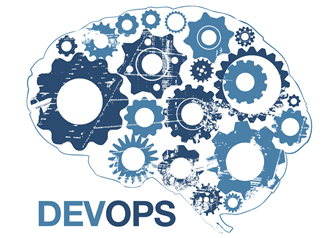
DevOps is not only the integration and transformation of development and operation methods, but also a corporate cultural revolution. Today, more and more enterprises are benefiting from DevOps, such as a more stable operating environment, faster product delivery and problem resolution cycles. Continuous delivery, continuous integration, and DevOps can improve enterprise products throughout the entire life cycle and meet customer needs faster, which is the key to building core competitiveness for enterprises in the future.
Although DevOps is still in the early stages of development, its impact on corporate culture and business has begun to appear. For companies that have just launched DevOps, it is crucial to choose the right communication tools. The following IT Manager Network has compiled Informationweek recommendations Top 10 Effective DevOps Collaboration Tools of 2017:
1. Microsoft TeamsMicrosoft Teams is a newcomer to the enterprise collaboration tool market. It was only released at the end of last year and was not officially launched until the first quarter of 2017. If your team is an Office 365 user, you can use Microsoft Teams for free. For Office365 , Teams is a great addition, and there's also Skype integration for video and audio calling. Unlike Slack, Teams uses a linear conversation approach, so each branch of the conversation remains independent.
Teams is more biased towards the operation side of DevOps rather than the development side, but with the strong support of Microsoft, Team will undoubtedly be a strong competitor in the DevOps collaboration tool market.
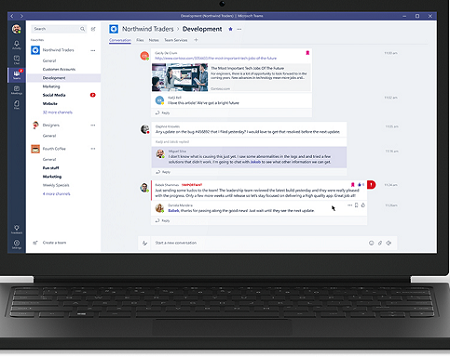
Download:https://itunes.apple.com/cn/app/microsoft-teams/id1113153706?mt=8
2. SlackSlack is a phenomenal product for DevOps collaboration. A large number of teams use Slack as the central platform for collaboration. Slack’s group chat function (kills email) and near-universal platform compatibility support make slack the darling of modern collaboration. , both in the developer world and at everyday social gatherings.
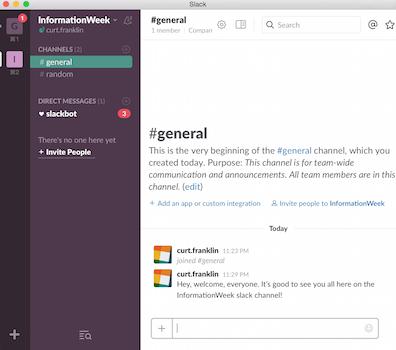
Download:https://itunes.apple.com/cn/app/slack-business-communication-for-teams/id618783545?mt=8
三、HipChatSimilar to Slack, HipChat also adopts a free entry version (Freemium) business model. The paid version adds functions such as video chat and group screen sharing. The free version also provides functions such as full-text conversation retrieval and file sharing.
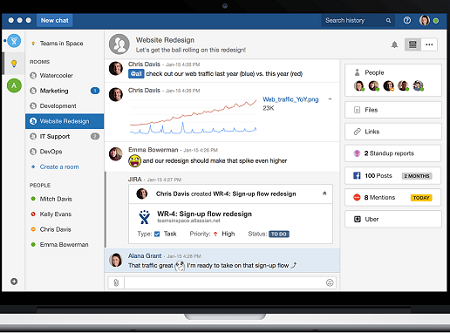
Download:https://itunes.apple.com/cn/app/hipchat-free-group-chat-for-teams-business/id418168984?mt=8
4. BasecampAs one of the oldest tools for contemporary online collaboration, Basecamp has nurtured countless collaboration teams for more than ten years, and its product power has never disappointed. The above recommended DevOps collaboration tools are all based on organizational concepts, while Basecamp is based on projects management model. Although BaseCamp also has a chat function (Campfire) and a linear message board, the core is still the to-do and calendar functions. Basecamp successfully integrates the above functions. Finally, Basecamp does not have a free version and only has a trial version in addition to the paid version.
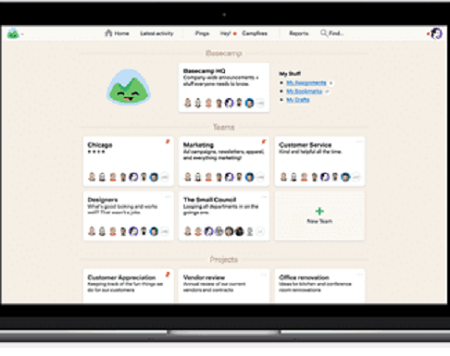
Download:https://itunes.apple.com/cn/app/basecamp-3/id1015603248?mt=8
五、FavroSimilar to Basecamp, Favro is also based on the project management model, but unlike Basecamp, Favro's basic functions are free.
Favro is mainly aimed at agile teams, using a simple agile workflow user interface to organize projects, tasks and schedules. If your team is already familiar with the "agile language", you will not be unfamiliar with Favro's interface labels. The best part is that Favro can also be integrated with the functions of tools such as Slack, GitHub and Dropbox, which further enhances Favro’s functionality, but unfortunately these require a paid version.
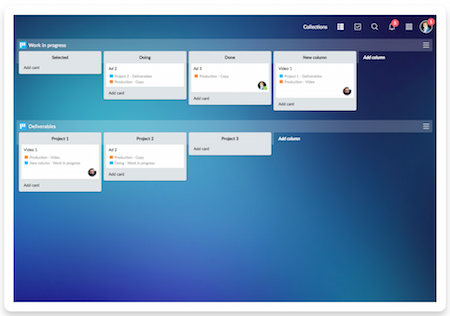
Download:https://itunes.apple.com/cn/app/favro/id975245623?mt=8&at=1000lwkA
The above is the detailed content of Five DevOps tools to improve productivity. For more information, please follow other related articles on the PHP Chinese website!

Hot AI Tools

Undresser.AI Undress
AI-powered app for creating realistic nude photos

AI Clothes Remover
Online AI tool for removing clothes from photos.

Undress AI Tool
Undress images for free

Clothoff.io
AI clothes remover

Video Face Swap
Swap faces in any video effortlessly with our completely free AI face swap tool!

Hot Article

Hot Tools

Notepad++7.3.1
Easy-to-use and free code editor

SublimeText3 Chinese version
Chinese version, very easy to use

Zend Studio 13.0.1
Powerful PHP integrated development environment

Dreamweaver CS6
Visual web development tools

SublimeText3 Mac version
God-level code editing software (SublimeText3)

Hot Topics
 1663
1663
 14
14
 1419
1419
 52
52
 1313
1313
 25
25
 1264
1264
 29
29
 1237
1237
 24
24
 Linux Architecture: Unveiling the 5 Basic Components
Apr 20, 2025 am 12:04 AM
Linux Architecture: Unveiling the 5 Basic Components
Apr 20, 2025 am 12:04 AM
The five basic components of the Linux system are: 1. Kernel, 2. System library, 3. System utilities, 4. Graphical user interface, 5. Applications. The kernel manages hardware resources, the system library provides precompiled functions, system utilities are used for system management, the GUI provides visual interaction, and applications use these components to implement functions.
 How to check the warehouse address of git
Apr 17, 2025 pm 01:54 PM
How to check the warehouse address of git
Apr 17, 2025 pm 01:54 PM
To view the Git repository address, perform the following steps: 1. Open the command line and navigate to the repository directory; 2. Run the "git remote -v" command; 3. View the repository name in the output and its corresponding address.
 What is the main purpose of Linux?
Apr 16, 2025 am 12:19 AM
What is the main purpose of Linux?
Apr 16, 2025 am 12:19 AM
The main uses of Linux include: 1. Server operating system, 2. Embedded system, 3. Desktop operating system, 4. Development and testing environment. Linux excels in these areas, providing stability, security and efficient development tools.
 How to run java code in notepad
Apr 16, 2025 pm 07:39 PM
How to run java code in notepad
Apr 16, 2025 pm 07:39 PM
Although Notepad cannot run Java code directly, it can be achieved by using other tools: using the command line compiler (javac) to generate a bytecode file (filename.class). Use the Java interpreter (java) to interpret bytecode, execute the code, and output the result.
 How to run sublime after writing the code
Apr 16, 2025 am 08:51 AM
How to run sublime after writing the code
Apr 16, 2025 am 08:51 AM
There are six ways to run code in Sublime: through hotkeys, menus, build systems, command lines, set default build systems, and custom build commands, and run individual files/projects by right-clicking on projects/files. The build system availability depends on the installation of Sublime Text.
 laravel installation code
Apr 18, 2025 pm 12:30 PM
laravel installation code
Apr 18, 2025 pm 12:30 PM
To install Laravel, follow these steps in sequence: Install Composer (for macOS/Linux and Windows) Install Laravel Installer Create a new project Start Service Access Application (URL: http://127.0.0.1:8000) Set up the database connection (if required)
 git software installation
Apr 17, 2025 am 11:57 AM
git software installation
Apr 17, 2025 am 11:57 AM
Installing Git software includes the following steps: Download the installation package and run the installation package to verify the installation configuration Git installation Git Bash (Windows only)
 How to set important Git configuration global properties
Apr 17, 2025 pm 12:21 PM
How to set important Git configuration global properties
Apr 17, 2025 pm 12:21 PM
There are many ways to customize a development environment, but the global Git configuration file is one that is most likely to be used for custom settings such as usernames, emails, preferred text editors, and remote branches. Here are the key things you need to know about global Git configuration files.




